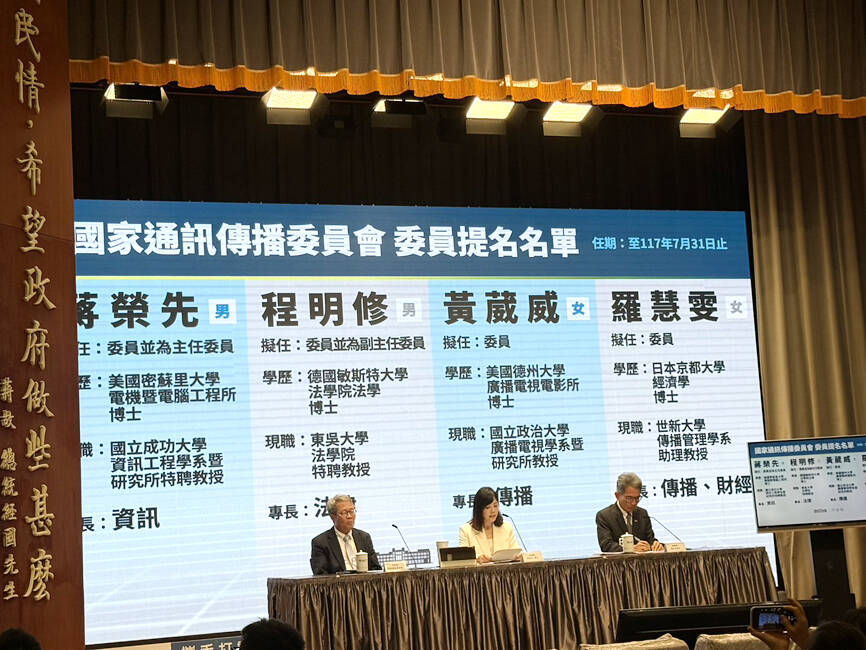The Executive Yuan yesterday announced four new nominees to serve as members of the National Communications Commission (NCC).
The commission has been unable to convene and rule on any case for the past eight months as it lacked the mandated quorum of four members needed to hold valid meetings.
The seven-member commission currently has only three commissioners.

Photo: Chung Li-hua, Taipei Times
The four nominees are National Cheng Kung University computer science and information engineering professor Chiang Jung-hsien (蔣榮先), Soochow University law professor Cherng Ming-shiou (程明修), National Chengchi University professor Vivian Huang (黃葳威) and Shih Hsin University assistant professor Lo Huei-wen (羅慧雯).
Chiang would serve as NCC chairman, while Cherng would serve as vice chairman, the Executive Yuan said.
Cherng is a member of the Chinese Nationalist Party (KMT), while the other three do not have party affiliations, it said.
The four nominees are qualified to be commissioners with their extensive expertise in information technology, law and mass communications, the Executive Yuan said.
Chiang specializes in artificial intelligence, cybersecurity and big data analysis, while Cherng focuses on economic administrative law, regulatory theories, concession laws, constitutional litigation and the fundamental right to information, it said.
Huang’s expertise includes the audiovisual media market, communication ethics, media literacy and cybersecurity, while Lo specializes in communication policies, the communications industry, public media and political economy, it added.
Their terms would end on July 31, 2028, the Executive Yuan said.
Aside from their expertise, the nominees’ political affiliation and gender were also taken into account to comply with the National Communications Commission Organization Act (通傳會組織法) and other regulations, it said.
“We hope that the Legislative Yuan would soon confirm the appointments to ensure that the commission can continue to operate,” it added.
The Executive Yuan last year nominated four people to replace the four outgoing members, but the legislature’s Transportation Committee twice rejected reviewing the nominations during the previous legislative session.
The Executive Yuan later asked then-NCC vice chairman Wong Po-tsung (翁柏宗), who was nominated to be NCC chairman, to temporarily assume the post of chairman.
However, the legislature passed an amendment to the National Communications Commission Organization Act that bans any NCC member from serving more than two terms.
Wong, who had served two terms, left after the amendment took effect.

Taipei, New Taipei City, Keelung and Taoyuan would issue a decision at 8pm on whether to cancel work and school tomorrow due to forecasted heavy rain, Keelung Mayor Hsieh Kuo-liang (謝國樑) said today. Hsieh told reporters that absent some pressing reason, the four northern cities would announce the decision jointly at 8pm. Keelung is expected to receive between 300mm and 490mm of rain in the period from 2pm today through 2pm tomorrow, Central Weather Administration data showed. Keelung City Government regulations stipulate that school and work can be canceled if rain totals in mountainous or low-elevation areas are forecast to exceed 350mm in

EVA Airways president Sun Chia-ming (孫嘉明) and other senior executives yesterday bowed in apology over the death of a flight attendant, saying the company has begun improving its health-reporting, review and work coordination mechanisms. “We promise to handle this matter with the utmost responsibility to ensure safer and healthier working conditions for all EVA Air employees,” Sun said. The flight attendant, a woman surnamed Sun (孫), died on Friday last week of undisclosed causes shortly after returning from a work assignment in Milan, Italy, the airline said. Chinese-language media reported that the woman fell ill working on a Taipei-to-Milan flight on Sept. 22

COUNTERMEASURE: Taiwan was to implement controls for 47 tech products bound for South Africa after the latter downgraded and renamed Taipei’s ‘de facto’ offices The Ministry of Foreign Affairs is still reviewing a new agreement proposed by the South African government last month to regulate the status of reciprocal representative offices, Minister of Foreign Affairs Lin Chia-lung (林佳龍) said yesterday. Asked about the latest developments in a year-long controversy over Taiwan’s de facto representative office in South Africa, Lin during a legislative session said that the ministry was consulting with legal experts on the proposed new agreement. While the new proposal offers Taiwan greater flexibility, the ministry does not find it acceptable, Lin said without elaborating. The ministry is still open to resuming retaliatory measures against South

1.4nm WAFERS: While TSMC is gearing up to expand its overseas production, it would also continue to invest in Taiwan, company chairman and CEO C.C. Wei said Taiwan Semiconductor Manufacturing Co (TSMC) has applied for permission to construct a new plant in the Central Taiwan Science Park (中部科學園區), which it would use for the production of new high-speed wafers, the National Science and Technology Council said yesterday. The council, which supervises three major science parks in Taiwan, confirmed that the Central Taiwan Science Park Bureau had received an application on Friday from TSMC, the world’s largest contract chipmaker, to commence work on the new A14 fab. A14 technology, a 1.4 nanometer (nm) process, is designed to drive artificial intelligence transformation by enabling faster computing and greater power